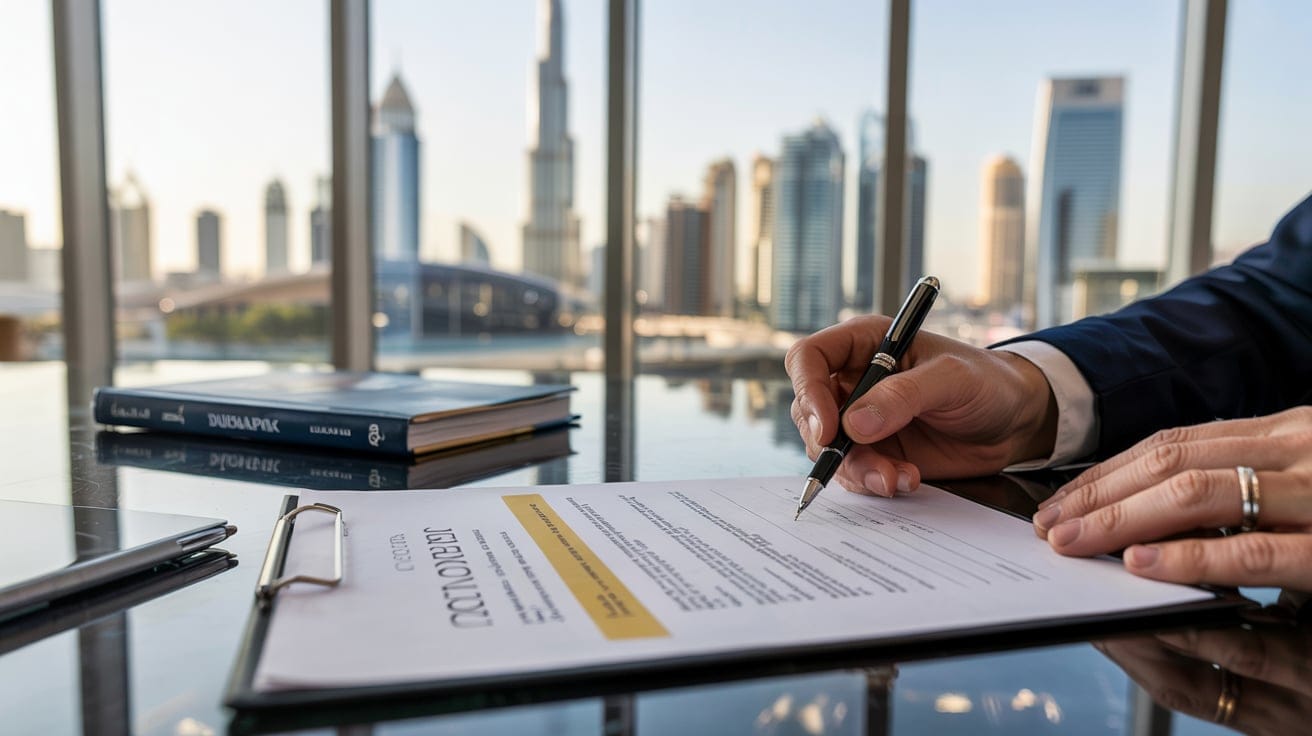Why Understanding Dubai’s Real Estate Laws is Important as Dubai’s real estate market is renowned for its Profitable investment opportunities, attracting both foreign and local buyers. However, understanding the real estate laws in Dubai is essential for securing your investment. Whether you’re purchasing a property for personal use or as an investment, navigating the legal framework can be challenging without the right knowledge.
To ensure a safe and beneficial transaction, both foreign investors and local buyers must familiarize themselves with property ownership laws in Dubai, mortgage regulations, and the registration process. Buyers need to understand the rights and restrictions tied to ownership, along with the regulations governing real estate transactions. A clear understanding of these regulations can also help you avoid legal pitfalls and make informed decisions.
Let’s find out the legal requirements for buying property in Dubai, the differences between freehold and leasehold properties, RERA regulations, and the key Dubai property laws for expats. By the end, you’ll have a comprehensive understanding of the legal framework that governs the Dubai real estate market, helping you make secure investment choices.
Legal Framework of Dubai’s Real Estate Market
Who Regulates Dubai’s Property Market? Dubai’s real estate market is governed by several key regulatory bodies to ensure transparency and fairness in all transactions. The two most prominent entities are:
- Dubai Land Department (DLD): The DLD is responsible for regulating property transactions, overseeing property ownership laws, and maintaining the property registry. It ensures that all properties are legally registered and transactions are legitimate.
- Real Estate Regulatory Agency (RERA): A division of the DLD, RERA plays a crucial role in enforcing Dubai property laws and ensuring transparency in the market. It handles dispute resolution, sets fair pricing guidelines, and works towards creating a reliable real estate environment.
Key Laws Governing Real Estate in Dubai
Several laws form the foundation of the Dubai real estate regulations. Some of the key laws include:
- Property Ownership Law (Law No. 7 of 2006) – This law defines foreign vs. local ownership rights in Dubai. It designates areas where foreigners can purchase property and outlines the eligibility for property ownership.
- Escrow Account Law (Law No. 8 of 2007) – Aimed at protecting off-plan buyers, this law ensures that developers maintain funds in an escrow account, safeguarding the buyer’s money until the property is delivered.
- Real Estate Brokers Law (Law No. 85 of 2006) – This law regulates the conduct of real estate agencies, including their licensing and commission structures, promoting transparency in the property market.
By understanding these laws, buyers can navigate the real estate process with confidence and avoid costly mistakes. For price outlooks and demand drivers before you commit, see Dubai Real Estate Market Trends | What to Expect in 2025.
Freehold vs. Leasehold Property Ownership
Freehold properties offer the most comprehensive ownership rights. When you buy a freehold property in Dubai, you gain full ownership of the land and the property for life. You have the freedom to sell, rent, or transfer the property as you wish, providing flexibility and long-term security.
Foreign buyers are allowed to purchase freehold properties in specific areas of Dubai, including renowned locations like Downtown Dubai, Dubai Marina, and Palm Jumeirah. These areas are designated as “freehold zones,” where foreign investors can own property outright.
What is Leasehold Property Ownership?
Leasehold property ownership, on the other hand, offers a limited ownership term. Typically, leasehold ownership is valid for 99 years or less, and although the buyer has full rights to the property during this period, the land remains under the control of the developer or landowner.
Leasehold properties are common in areas like Deira, Mirdif, and Al Barsha. While leasehold owners have the right to sell or transfer the property, they must seek approval from the landowner or developer, depending on the lease terms.
Comparison Table | Freehold vs. Leasehold
| Aspect | Freehold Property | Leasehold Property |
| Ownership Rights | Full ownership | Limited to 99 years |
| Foreign Ownership | Allowed in designated areas | Restricted |
| Inheritance Rights | Can be inherited | Depends on lease terms |
| Property Control | Can sell, rent, or transfer | Requires landlord approval |
Legal Requirements for Buying Property in Dubai
Buying a property in Dubai involves several legal steps to ensure a secure transaction. Here’s a simple breakdown of the process:
1️⃣ Choose a Property & Verify Ownership
Before purchasing a property, ensure it is registered with the Dubai Land Department (DLD). Verify the developer’s credentials and ownership documents.
2️⃣ Sign a Sales Agreement (MoU)
Once you’ve chosen your property, you will sign a Memorandum of Understanding (MoU) (Form F) with the seller. This legally binding agreement outlines the terms of the sale.
3️⃣ Pay the Deposit
A 10% deposit is typically required to secure the property. The deposit is usually held in an escrow account, ensuring the buyer’s money is protected.
4️⃣ Obtain a No Objection Certificate (NOC)
The NOC is crucial in confirming that the property has no outstanding debts or legal disputes. It is typically obtained from the developer or seller.
5️⃣ Complete Property Transfer
Once all paperwork is complete, the buyer and seller meet at the Dubai Land Department (DLD) to officially transfer the property. The DLD will update the property registration to reflect the new owner. If you’re still weighing a rental first, shortlist neighborhoods with Guide to Renting Apartments in Dubai | Expert Tips.
This structured process ensures that buyers in Dubai can safely purchase real estate while complying with all property laws in Dubai.
Mortgage & Financing Regulations
For expats and UAE nationals looking to finance their property purchase, mortgage regulations in Dubai play a key role in determining how much you can borrow. The loan-to-value (LTV) ratio is an important factor in mortgage financing, which varies based on property price.
- Expats are allowed to finance up to 80% of the property value for properties under AED 5 million. For properties above AED 5 million, the LTV ratio drops to 70%.
- UAE nationals can finance 85% of the property value for properties below AED 5 million, and 75% for properties above AED 5 million.
Loan-to-Value (LTV) Ratio Breakdown
| Property Price | Expats LTV % | UAE Nationals LTV % |
| Below AED 5M | 80% | 85% |
| Above AED 5M | 70% | 75% |
This structure is designed to promote responsible borrowing while ensuring that buyers have a substantial stake in their investment. It’s crucial to understand these mortgage laws in Dubai to secure financing that suits your needs.
Property Registration & Fees
All property transactions in Dubai must be registered with the Dubai Land Department (DLD) to be legally recognized. The DLD is the official body that oversees property ownership, and the registration process ensures that the transfer of ownership is recorded accurately.
Breakdown of Property Registration Fees
Understanding the costs involved in property registration is crucial for budgeting your investment. Here’s a breakdown of the common fees:
- 4% DLD Registration Fee – Paid by the buyer, this fee is calculated based on the property’s sale price.
- Title Deed Fee (AED 520) – This fee is charged for issuing the official title deed once the property transfer is complete.
- Real Estate Agent Commission (2%) – If you’re using a real estate broker, they will typically charge a 2% commission on the property value.
- Mortgage Registration Fee (0.25%) – If you’re financing the purchase through a bank, this fee is applied to register the mortgage.
These fees must be factored into the overall cost of the property transaction, and it’s essential to plan accordingly.
RERA Regulations & Buyer Protections
How RERA Protects Property Buyers
The Real Estate Regulatory Agency (RERA) plays a pivotal role in safeguarding property buyers in Dubai. As a regulatory arm of the Dubai Land Department, RERA oversees several key protections for buyers:
- Rental Dispute Resolution: RERA provides a platform for resolving disputes between tenants and landlords regarding rental agreements. This ensures fair treatment and minimizes legal risks.
- Escrow Accounts for Off-Plan Buyers: Developers are required to use escrow accounts to protect off-plan buyers from potential fraud. The law ensures that buyer funds are only released to developers when construction milestones are met, safeguarding investments.
- Price Transparency: RERA regulates property pricing to ensure that prices are fair and transparent, reducing the likelihood of market manipulation. This helps prevent inflated prices and encourages trust in the Dubai property market.
By enforcing these regulations, RERA ensures that Dubai’s real estate market remains secure, transparent, and buyer-friendly.
Common Legal Mistakes Buyers Should Avoid
While navigating Dubai’s property laws, buyers can make costly mistakes that may lead to legal complications. Here are some common legal pitfalls to avoid:
❌ Not Verifying Property Ownership: Always confirm that the property you wish to buy is legally owned by the seller. Failure to verify with the Dubai Land Department (DLD) could lead to disputes.
❌ Not Registering the Tenancy Contract: If you’re buying a property that will be rented out, ensure the tenancy contract is registered with Ejari. Not doing so may result in fines or legal complications.
❌ Ignoring the Service Charges: Many buyers neglect to factor in service charges for maintenance and communal facilities. These fees can add up, so it’s important to understand the costs before purchasing.
By avoiding these common mistakes, buyers can protect themselves from unnecessary legal issues and ensure a smooth property transaction.
Future of Dubai Real Estate Laws & Market Outlook
Dubai’s real estate laws are continuously evolving to maintain transparency and encourage investment. In the coming years, the government plans to introduce digital property transactions to streamline the registration process. This will enhance efficiency and reduce paperwork, making property transactions quicker and more accessible.
Moreover, the introduction of new residency laws, including the Golden Visa for property buyers in Dubai, is expected to further boost foreign investments. With long-term residency options for property owners, Dubai will attract even more international buyers. For eligibility paths tied to property values, see UAE Golden Visa | Secure Residency Through Real Estate.
Overall, the future of the Dubai real estate market looks promising. With strong legal frameworks and government initiatives, it continues to be one of the most profitable property markets globally.
Why Understanding Dubai’s Real Estate Laws Matters
Understanding Dubai’s real estate regulations is essential for ensuring a secure and legal property investment. Whether you’re an expat or a UAE national, having a thorough knowledge of property ownership laws in Dubai, mortgage regulations, and the registration process can help you avoid costly mistakes and safeguard your investment.
To make the process smoother, it’s recommended to work with licensed real estate agents and legal consultants. They can guide you through the legal complexities and ensure that all your transactions comply with the laws. Dubai’s legal landscape is designed to provide both foreign and local buyers with buyer protections, transparency, and support, making it one of the safest and most attractive property markets in the world.
With a well-regulated market, ongoing reforms, and a stable economic environment, Dubai remains a top destination for real estate investors looking for secure, long-term growth opportunities.







